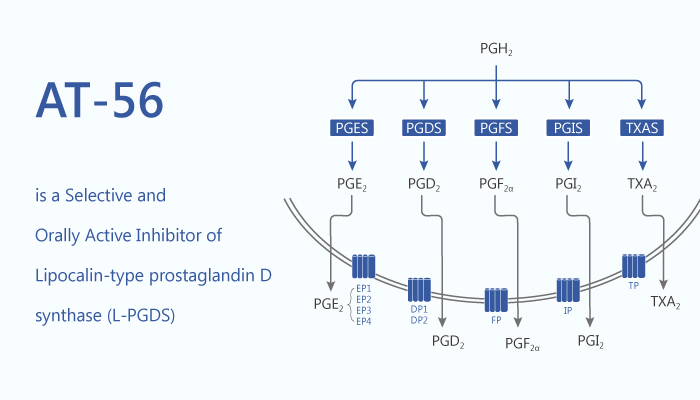Prostaglandin D2 (PGD2) is a major inflammatory mediator produced by mast cells and Th2 cells. PGD2 is a lipid mediator involved in sleep and inflammatory responses. Besides, PGD2 activates two different types of receptors DP1 and DP2 and regulates sleep and pain in the central nervous system. Therefore, PGD2 coordinately regulates allergic reactions, especially airway inflammation, via these two receptors.
There are two distinct types of PGD synthase (PGDS), namely L-PGDS and H-PGDS. L-PGDS contributes to the production of PGD2 in the central nervous system, ocular tissues, and cardiovascular systems. H-PGDS is the first known vertebrate homolog of the σ class of glutathione S-transferases. In the present study, researchers characterized AT-56, which is a competitive inhibitor of L-PGDS against PGH2.
AT-56 is an orally active and selective inhibitor of lipocalin-type prostaglandin (PG) D synthase (L-PGDS). In addition, AT-56 inhibits human and mouse L-PGDSs in a concentration dependent manner. Particularly, AT-56 inhibits the L-PGDS activity in a competitive manner with a Ki value of 75 μM. Furthermore, AT-56 inhibits the production of PGD2 by L-PGDS-expressing human TE-671 cells after stimulation with Ca2+ ionophore (5 μM A23187) with an IC50 value of about 3 μM. Moreover, AT-56 also suppresses the accumulation of eosinophils and monocytes in the bronco-alveolar lavage fluid from the antigen-induced lung inflammation model of human L-PGDS-transgenic mice. In addition, AT-56 inhibits the production of PGD2 by L-PGDS-expressing cultured cells, H-PGDS gene knock-out mice, and human L-PGDS overexpressing transgenic mice.

All in all, AT-56 is a selective and/or nonselective inhibitor for L-PGDS and H-PGDS, which may act as anti-somnolence and anti-inflammatory agent.